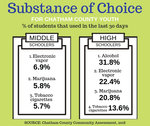


MEBANE — Jane Smith — not her real name, for obvious reasons — started smoking marijuana at age 12.
She did so again this week.
That wouldn’t make the 56-year-old Mebane resident alone — according to various reports, up to 11 percent of Americans aged 50 to 64 use marijuana, and some studies say seniors are the fastest-growing group of marijuana users in the U.S.
As for Smith, she used it from age 12 until about 30, when she had children. But “several years ago,” she said, she resumed marijuana use.
“I’m in several women’s groups. Half of them use it for the same reason,” Smith said. “Everybody that grew up in the last couple of years of the baby boomers are now turning to it for pain relief. Especially since no one will prescribe anything to you any more.”
While North Carolina has not legalized marijuana for recreational or medical use, the state is increasingly becoming an outlier among its peers.
According to the National Conference of State Legislatures, 14 U.S. states and territories have approved recreational adult use of cannabis, and 34 states have approved medical marijuana programs. Whether or not North Carolina is on the verge of approving legal use, that hasn’t stopped North Carolinians, and Chatham County residents, from smoking pot.
Chatham County is no different from many counties in marijuana use, both by adults and youth. In the first six months of 2019, 17 individuals were arrested in Chatham with primary charges stemming from marijuana possession or distribution. According to the 2018 Chatham County Community Assessment, one-quarter of Chatham adults said a friend or family member had used an illicit drug in the last year, and marijuana accounted for 83 percent of those responses.
The statistics on youth use are a little more straightforward. According to the 2017 Youth Risk Behavior Survey, 37.3 percent of Chatham high schoolers said they had tried marijuana, 7.7 percent said they had tried it before age 13 and 20.8 percent reported they had used it in the last 30 days.
This comes in a county where 27.2 percent of high schoolers reported they had been offered, sold or given an illegal drug on school property in the past year — a significant difference from the 19.8 percent of U.S. teens. In the same survey, 5.8 percent of Chatham middle school students said they had used marijuana in the last 30 days.
So while possession is not legal yet, that hasn’t stopped locals from use and distribution.
Illinois is the most recent state to make it legal. On June 24, Gov. J.B. Pritzer’s signature legalized possession of up to 30 grams for in-state residents and 15 grams for out-of-state residents and set up a program to expunge various convictions related to marijuana possession and distribution.
“Legalizing adult-use cannabis brings an important and overdue change to our state, and it’s the right thing to do,” Pritzer said in a statement. “I’m so proud that our state is leading with equity and justice in its approach to cannabis legalization and its regulatory framework. Because of the work of the people here today and so many more all across our state, Illinois is moving forward with empathy and hope.”
George Gregor-Holt, the community outreach director of the nonprofit Chatham Drug Free, said he’s concerned about the spread of legalization and how it might affect young people.
“What the cannabis industry is doing now is they’re trying to portray cannabis as a relatively safe drug,” he said. “So they are trying to decrease perceived harmfulness, which they hope will increase usage. That’s what we have to worry about here in North Carolina. Youngsters aren’t stupid, they’re pretty savvy. They see all these states that are going recreational, and they’re thinking to themselves, ‘Well, it can’t be such a big deal,’ so their perceived harmfulness is going down, which we predict will show in increased usage when we do surveys.”
A similar bill has been proposed this session in the N.C. General Assembly — the Senate version is co-sponsored by Chatham’s Sen. Valerie Foushee, a Democrat — that would legalize possession of marijuana up to four ounces and expunge any prior convictions related to possession of up to four ounces. A group of N.C. House members have filed a bill that would legalize medical cannabis.
Gregor-Holt said he is in support of legalizing cannabis possession for both medicinal and recreational use, but he is quick to share his reservations.
“With both medicinal and recreational legalization, there is the risk of young people believing that because the substance is legal, it must be safe,” he said. “There is clear scientific evidence that those attitudes lead to increased substance use. We already have that problem with prescription medication, alcohol and tobacco. Adding another will make it even harder to convince young people that substance use has serious negative consequences for their developing brain and their future.”
According to the American Addiction Centers, one in 11 users of marijuana become addicted to the substance, and the National Institute on Drug Abuse reports that between 9 and 30 percent of users may develop some degree of marijuana use disorder, which takes the form of addiction in most cases. The NIDA adds that people who begin using marijuana before the age of 18 are four to seven times more likely to develop a marijuana use disorder than adults.
In 2015, about 4 million people in the U.S. met the diagnostic criteria for marijuana use disorder, but just 138,000 voluntarily sought treatment for it.
Gregor-Holt also pointed to a 2018 study by the Colorado Division of Criminal Justice Office of Research and Statistics called “Impacts on Marijuana Legalization in Colorado.” The state made marijuana legal in January 2014.
According to the report, felony marijuana court case filings increased from the beginning of legalization. One-hundred and thirty-nine traffic fatalities in 2017 involved a driver testing positive for any cannabinoid, up from 55 four years before, and rates of hospitalization with possible marijuana exposure increased from 2000 through 2015.
“Data from Colorado, the first state to legalize recreational use, indicates that it is creating more problems than it solves,” Gregor-Holt said. “It’s not all roses. People need to understand that there are consequences — physical, emotional, mental — that are associated with cannabis use and that it’s probably not such a good idea.”CBD — or cannabidiol — products have sprung up in convenience stores and grocery stores around the state in recent years. They often have very low amounts of THC, the addictive chemical in marijuana, and are often used for pain and anxiety. But some users are not convinced of its medical power compared to the real thing.
“They sell CBD stuff around here now, but that just doesn’t cut it,” Smith said. “It really doesn’t have a lot of pain relief. It will help you sleep, but it doesn’t have any pain-relieving stuff.”
And according to Smith, the potency of marijuana has grown since she began using.
“In high school, every couple of days we’d buy $20 worth, which was enough to sell a couple joints to pay for it,” she said. “It does now in a couple of hits what it used to take 5-6 joints to do. It’s pretty potent.”
So while North Carolina waits to legalize — if they ever do — Smith will continue to puff.
Reporter Zachary Horner can be reached at zhorner@chathamnr.com or on Twitter at @ZachHornerCNR.